POL10001: Analysis of Political Culture and Issues in Australia
VerifiedAdded on 2021/02/20
|8
|2517
|52
Essay
AI Summary
This essay provides an overview of Australian politics, focusing on its political culture and the challenges it faces. It explores the framework of a federal parliamentary constitutional monarchy and the influence of political culture on the country's political processes and behaviors. The essay highlights issues such as political apathy and cynicism, examining their causes and impacts on voter turnout and democratic processes. It discusses the constitution, major political parties, and the decline in public trust in the government. The analysis covers the lack of ideological dichotomy, competition among parties, and the impact of political leaders' actions on public perception. The essay concludes by emphasizing the threats posed by these issues to Australian democracy and the importance of addressing them to maintain a healthy political environment.
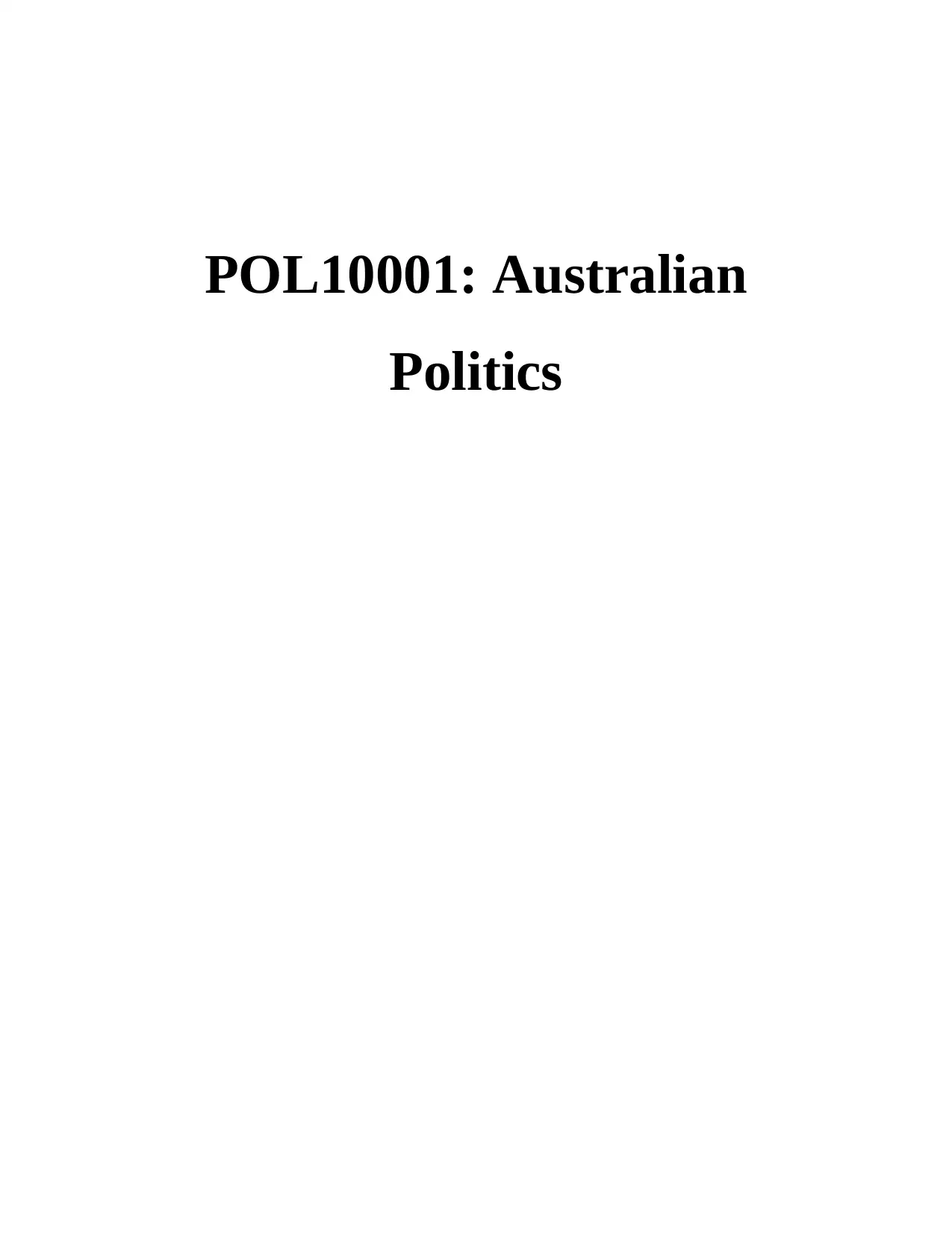
POL10001: Australian
Politics
Politics
Paraphrase This Document
Need a fresh take? Get an instant paraphrase of this document with our AI Paraphraser

TABLE OF CONTENTS
INTRODUCTION...........................................................................................................................3
MAIN BODY...................................................................................................................................3
CONCLUSION................................................................................................................................7
REFERENCES................................................................................................................................8
INTRODUCTION...........................................................................................................................3
MAIN BODY...................................................................................................................................3
CONCLUSION................................................................................................................................7
REFERENCES................................................................................................................................8
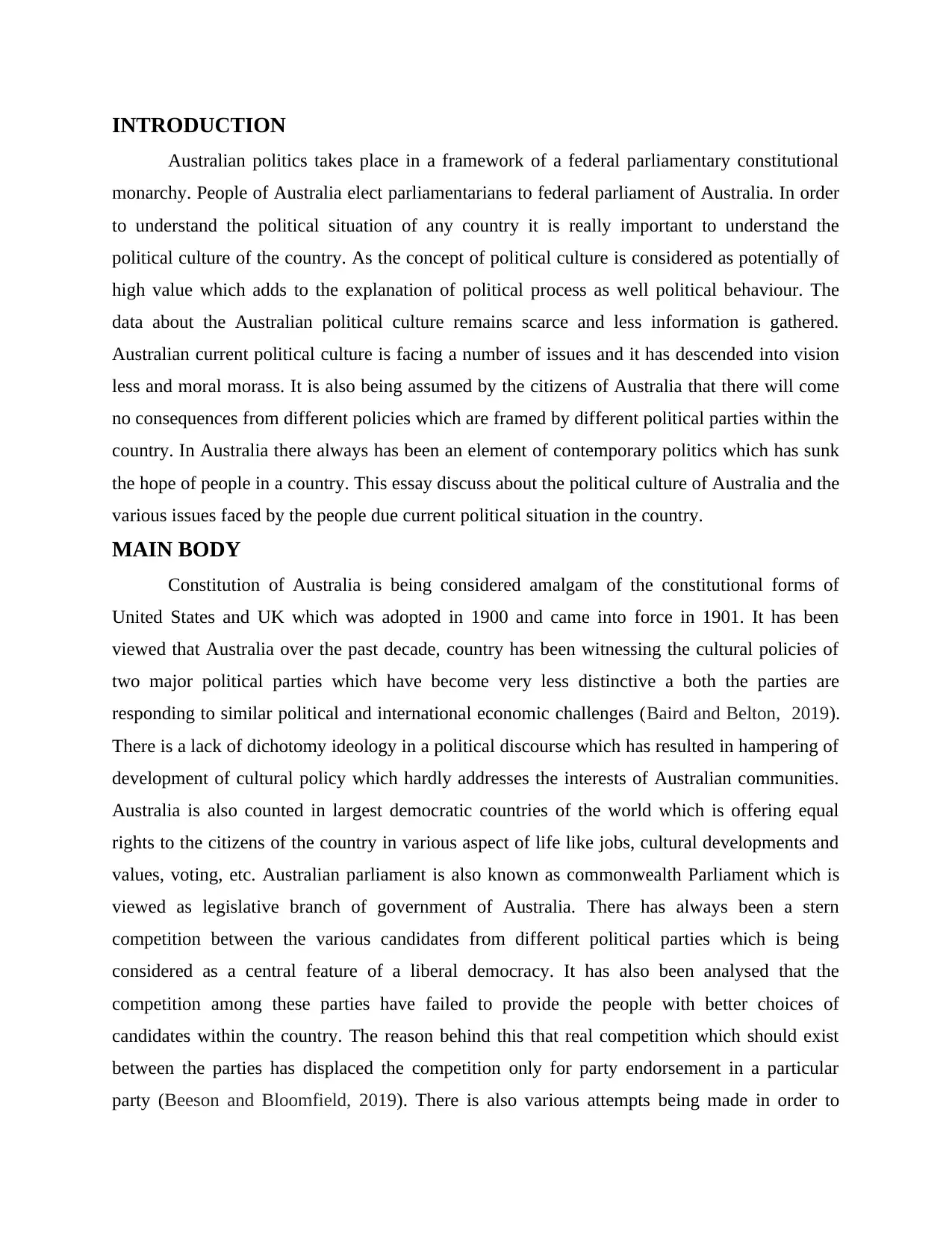
INTRODUCTION
Australian politics takes place in a framework of a federal parliamentary constitutional
monarchy. People of Australia elect parliamentarians to federal parliament of Australia. In order
to understand the political situation of any country it is really important to understand the
political culture of the country. As the concept of political culture is considered as potentially of
high value which adds to the explanation of political process as well political behaviour. The
data about the Australian political culture remains scarce and less information is gathered.
Australian current political culture is facing a number of issues and it has descended into vision
less and moral morass. It is also being assumed by the citizens of Australia that there will come
no consequences from different policies which are framed by different political parties within the
country. In Australia there always has been an element of contemporary politics which has sunk
the hope of people in a country. This essay discuss about the political culture of Australia and the
various issues faced by the people due current political situation in the country.
MAIN BODY
Constitution of Australia is being considered amalgam of the constitutional forms of
United States and UK which was adopted in 1900 and came into force in 1901. It has been
viewed that Australia over the past decade, country has been witnessing the cultural policies of
two major political parties which have become very less distinctive a both the parties are
responding to similar political and international economic challenges (Baird and Belton, 2019).
There is a lack of dichotomy ideology in a political discourse which has resulted in hampering of
development of cultural policy which hardly addresses the interests of Australian communities.
Australia is also counted in largest democratic countries of the world which is offering equal
rights to the citizens of the country in various aspect of life like jobs, cultural developments and
values, voting, etc. Australian parliament is also known as commonwealth Parliament which is
viewed as legislative branch of government of Australia. There has always been a stern
competition between the various candidates from different political parties which is being
considered as a central feature of a liberal democracy. It has also been analysed that the
competition among these parties have failed to provide the people with better choices of
candidates within the country. The reason behind this that real competition which should exist
between the parties has displaced the competition only for party endorsement in a particular
party (Beeson and Bloomfield, 2019). There is also various attempts being made in order to
Australian politics takes place in a framework of a federal parliamentary constitutional
monarchy. People of Australia elect parliamentarians to federal parliament of Australia. In order
to understand the political situation of any country it is really important to understand the
political culture of the country. As the concept of political culture is considered as potentially of
high value which adds to the explanation of political process as well political behaviour. The
data about the Australian political culture remains scarce and less information is gathered.
Australian current political culture is facing a number of issues and it has descended into vision
less and moral morass. It is also being assumed by the citizens of Australia that there will come
no consequences from different policies which are framed by different political parties within the
country. In Australia there always has been an element of contemporary politics which has sunk
the hope of people in a country. This essay discuss about the political culture of Australia and the
various issues faced by the people due current political situation in the country.
MAIN BODY
Constitution of Australia is being considered amalgam of the constitutional forms of
United States and UK which was adopted in 1900 and came into force in 1901. It has been
viewed that Australia over the past decade, country has been witnessing the cultural policies of
two major political parties which have become very less distinctive a both the parties are
responding to similar political and international economic challenges (Baird and Belton, 2019).
There is a lack of dichotomy ideology in a political discourse which has resulted in hampering of
development of cultural policy which hardly addresses the interests of Australian communities.
Australia is also counted in largest democratic countries of the world which is offering equal
rights to the citizens of the country in various aspect of life like jobs, cultural developments and
values, voting, etc. Australian parliament is also known as commonwealth Parliament which is
viewed as legislative branch of government of Australia. There has always been a stern
competition between the various candidates from different political parties which is being
considered as a central feature of a liberal democracy. It has also been analysed that the
competition among these parties have failed to provide the people with better choices of
candidates within the country. The reason behind this that real competition which should exist
between the parties has displaced the competition only for party endorsement in a particular
party (Beeson and Bloomfield, 2019). There is also various attempts being made in order to
⊘ This is a preview!⊘
Do you want full access?
Subscribe today to unlock all pages.

Trusted by 1+ million students worldwide
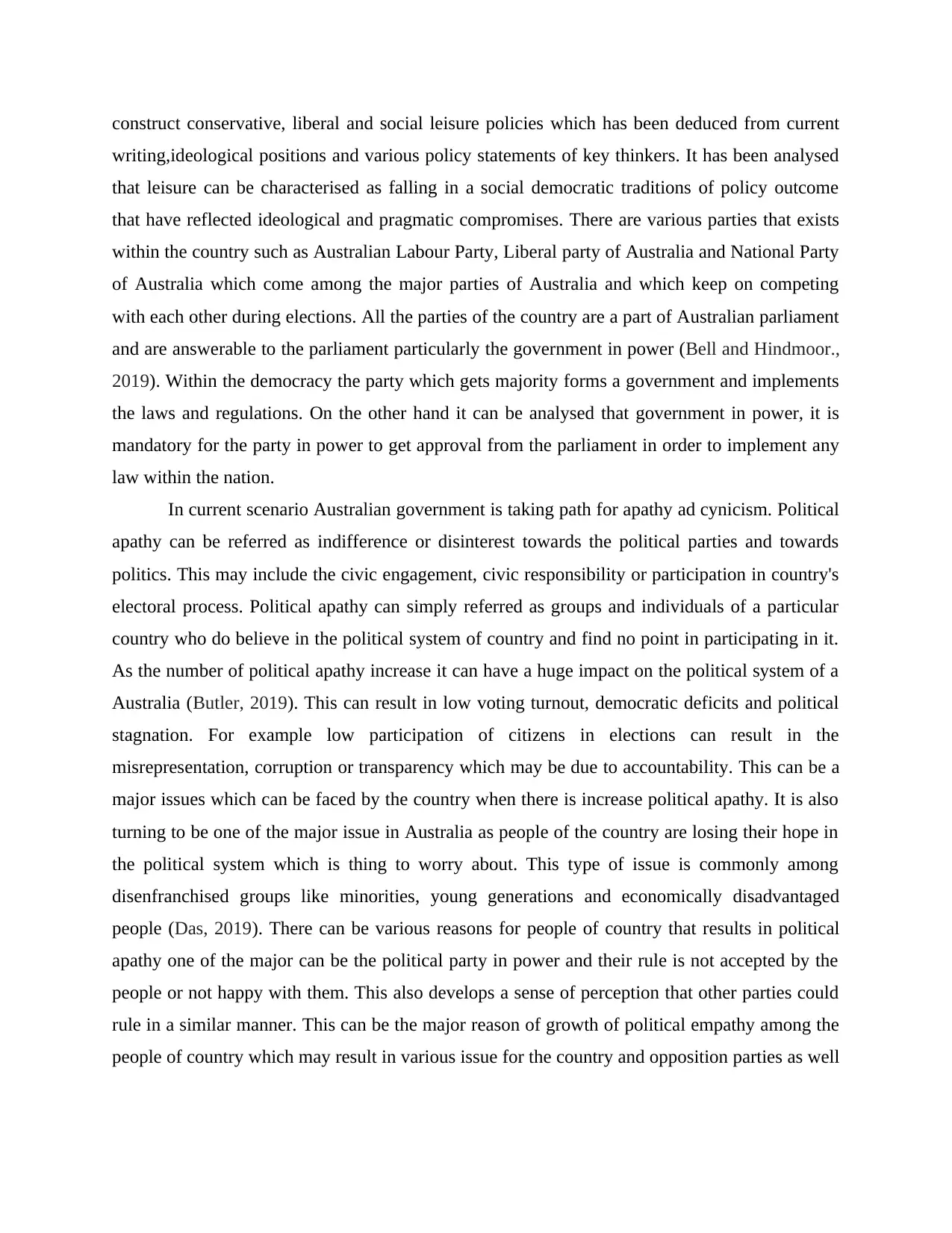
construct conservative, liberal and social leisure policies which has been deduced from current
writing,ideological positions and various policy statements of key thinkers. It has been analysed
that leisure can be characterised as falling in a social democratic traditions of policy outcome
that have reflected ideological and pragmatic compromises. There are various parties that exists
within the country such as Australian Labour Party, Liberal party of Australia and National Party
of Australia which come among the major parties of Australia and which keep on competing
with each other during elections. All the parties of the country are a part of Australian parliament
and are answerable to the parliament particularly the government in power (Bell and Hindmoor.,
2019). Within the democracy the party which gets majority forms a government and implements
the laws and regulations. On the other hand it can be analysed that government in power, it is
mandatory for the party in power to get approval from the parliament in order to implement any
law within the nation.
In current scenario Australian government is taking path for apathy ad cynicism. Political
apathy can be referred as indifference or disinterest towards the political parties and towards
politics. This may include the civic engagement, civic responsibility or participation in country's
electoral process. Political apathy can simply referred as groups and individuals of a particular
country who do believe in the political system of country and find no point in participating in it.
As the number of political apathy increase it can have a huge impact on the political system of a
Australia (Butler, 2019). This can result in low voting turnout, democratic deficits and political
stagnation. For example low participation of citizens in elections can result in the
misrepresentation, corruption or transparency which may be due to accountability. This can be a
major issues which can be faced by the country when there is increase political apathy. It is also
turning to be one of the major issue in Australia as people of the country are losing their hope in
the political system which is thing to worry about. This type of issue is commonly among
disenfranchised groups like minorities, young generations and economically disadvantaged
people (Das, 2019). There can be various reasons for people of country that results in political
apathy one of the major can be the political party in power and their rule is not accepted by the
people or not happy with them. This also develops a sense of perception that other parties could
rule in a similar manner. This can be the major reason of growth of political empathy among the
people of country which may result in various issue for the country and opposition parties as well
writing,ideological positions and various policy statements of key thinkers. It has been analysed
that leisure can be characterised as falling in a social democratic traditions of policy outcome
that have reflected ideological and pragmatic compromises. There are various parties that exists
within the country such as Australian Labour Party, Liberal party of Australia and National Party
of Australia which come among the major parties of Australia and which keep on competing
with each other during elections. All the parties of the country are a part of Australian parliament
and are answerable to the parliament particularly the government in power (Bell and Hindmoor.,
2019). Within the democracy the party which gets majority forms a government and implements
the laws and regulations. On the other hand it can be analysed that government in power, it is
mandatory for the party in power to get approval from the parliament in order to implement any
law within the nation.
In current scenario Australian government is taking path for apathy ad cynicism. Political
apathy can be referred as indifference or disinterest towards the political parties and towards
politics. This may include the civic engagement, civic responsibility or participation in country's
electoral process. Political apathy can simply referred as groups and individuals of a particular
country who do believe in the political system of country and find no point in participating in it.
As the number of political apathy increase it can have a huge impact on the political system of a
Australia (Butler, 2019). This can result in low voting turnout, democratic deficits and political
stagnation. For example low participation of citizens in elections can result in the
misrepresentation, corruption or transparency which may be due to accountability. This can be a
major issues which can be faced by the country when there is increase political apathy. It is also
turning to be one of the major issue in Australia as people of the country are losing their hope in
the political system which is thing to worry about. This type of issue is commonly among
disenfranchised groups like minorities, young generations and economically disadvantaged
people (Das, 2019). There can be various reasons for people of country that results in political
apathy one of the major can be the political party in power and their rule is not accepted by the
people or not happy with them. This also develops a sense of perception that other parties could
rule in a similar manner. This can be the major reason of growth of political empathy among the
people of country which may result in various issue for the country and opposition parties as well
Paraphrase This Document
Need a fresh take? Get an instant paraphrase of this document with our AI Paraphraser
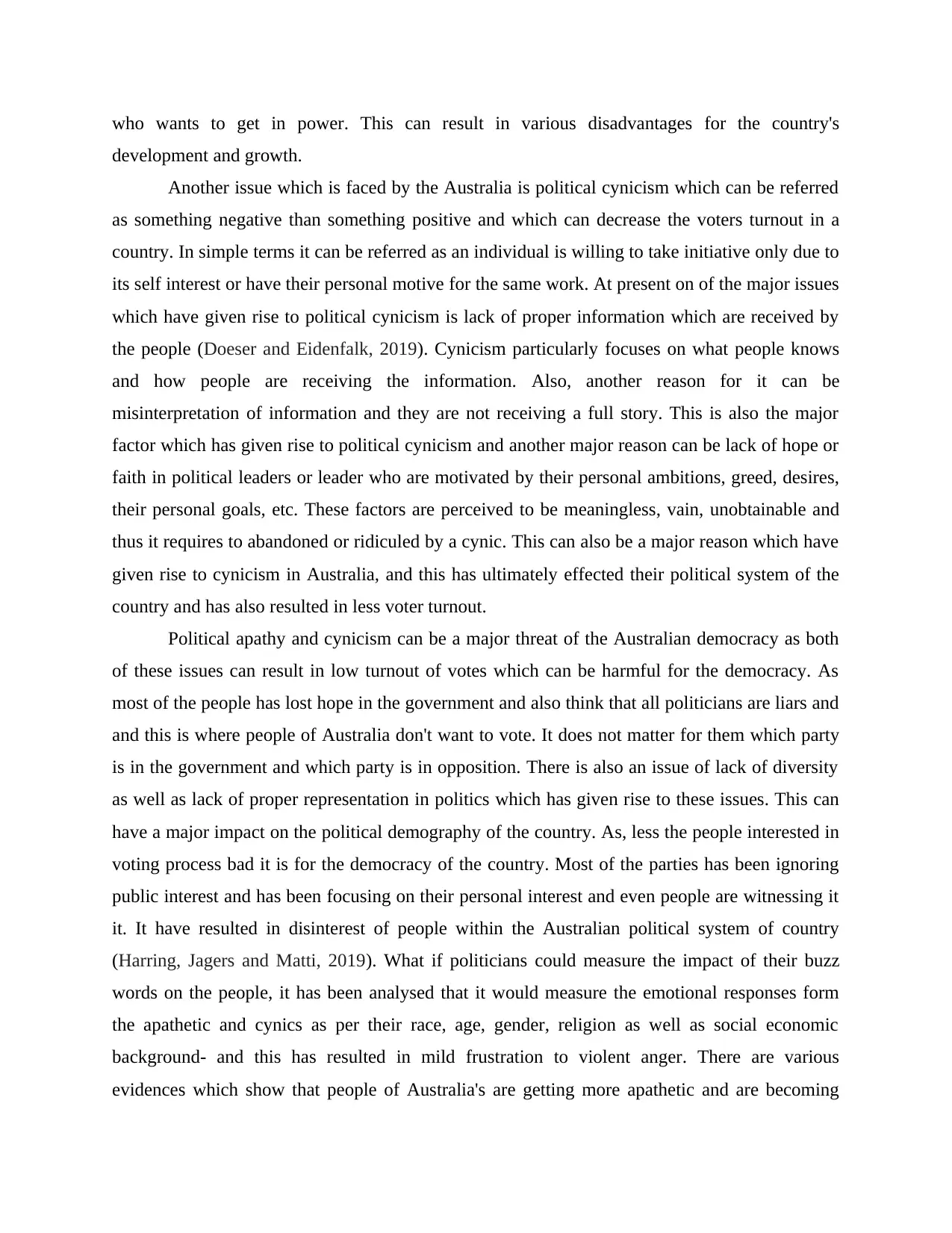
who wants to get in power. This can result in various disadvantages for the country's
development and growth.
Another issue which is faced by the Australia is political cynicism which can be referred
as something negative than something positive and which can decrease the voters turnout in a
country. In simple terms it can be referred as an individual is willing to take initiative only due to
its self interest or have their personal motive for the same work. At present on of the major issues
which have given rise to political cynicism is lack of proper information which are received by
the people (Doeser and Eidenfalk, 2019). Cynicism particularly focuses on what people knows
and how people are receiving the information. Also, another reason for it can be
misinterpretation of information and they are not receiving a full story. This is also the major
factor which has given rise to political cynicism and another major reason can be lack of hope or
faith in political leaders or leader who are motivated by their personal ambitions, greed, desires,
their personal goals, etc. These factors are perceived to be meaningless, vain, unobtainable and
thus it requires to abandoned or ridiculed by a cynic. This can also be a major reason which have
given rise to cynicism in Australia, and this has ultimately effected their political system of the
country and has also resulted in less voter turnout.
Political apathy and cynicism can be a major threat of the Australian democracy as both
of these issues can result in low turnout of votes which can be harmful for the democracy. As
most of the people has lost hope in the government and also think that all politicians are liars and
and this is where people of Australia don't want to vote. It does not matter for them which party
is in the government and which party is in opposition. There is also an issue of lack of diversity
as well as lack of proper representation in politics which has given rise to these issues. This can
have a major impact on the political demography of the country. As, less the people interested in
voting process bad it is for the democracy of the country. Most of the parties has been ignoring
public interest and has been focusing on their personal interest and even people are witnessing it
it. It have resulted in disinterest of people within the Australian political system of country
(Harring, Jagers and Matti, 2019). What if politicians could measure the impact of their buzz
words on the people, it has been analysed that it would measure the emotional responses form
the apathetic and cynics as per their race, age, gender, religion as well as social economic
background- and this has resulted in mild frustration to violent anger. There are various
evidences which show that people of Australia's are getting more apathetic and are becoming
development and growth.
Another issue which is faced by the Australia is political cynicism which can be referred
as something negative than something positive and which can decrease the voters turnout in a
country. In simple terms it can be referred as an individual is willing to take initiative only due to
its self interest or have their personal motive for the same work. At present on of the major issues
which have given rise to political cynicism is lack of proper information which are received by
the people (Doeser and Eidenfalk, 2019). Cynicism particularly focuses on what people knows
and how people are receiving the information. Also, another reason for it can be
misinterpretation of information and they are not receiving a full story. This is also the major
factor which has given rise to political cynicism and another major reason can be lack of hope or
faith in political leaders or leader who are motivated by their personal ambitions, greed, desires,
their personal goals, etc. These factors are perceived to be meaningless, vain, unobtainable and
thus it requires to abandoned or ridiculed by a cynic. This can also be a major reason which have
given rise to cynicism in Australia, and this has ultimately effected their political system of the
country and has also resulted in less voter turnout.
Political apathy and cynicism can be a major threat of the Australian democracy as both
of these issues can result in low turnout of votes which can be harmful for the democracy. As
most of the people has lost hope in the government and also think that all politicians are liars and
and this is where people of Australia don't want to vote. It does not matter for them which party
is in the government and which party is in opposition. There is also an issue of lack of diversity
as well as lack of proper representation in politics which has given rise to these issues. This can
have a major impact on the political demography of the country. As, less the people interested in
voting process bad it is for the democracy of the country. Most of the parties has been ignoring
public interest and has been focusing on their personal interest and even people are witnessing it
it. It have resulted in disinterest of people within the Australian political system of country
(Harring, Jagers and Matti, 2019). What if politicians could measure the impact of their buzz
words on the people, it has been analysed that it would measure the emotional responses form
the apathetic and cynics as per their race, age, gender, religion as well as social economic
background- and this has resulted in mild frustration to violent anger. There are various
evidences which show that people of Australia's are getting more apathetic and are becoming
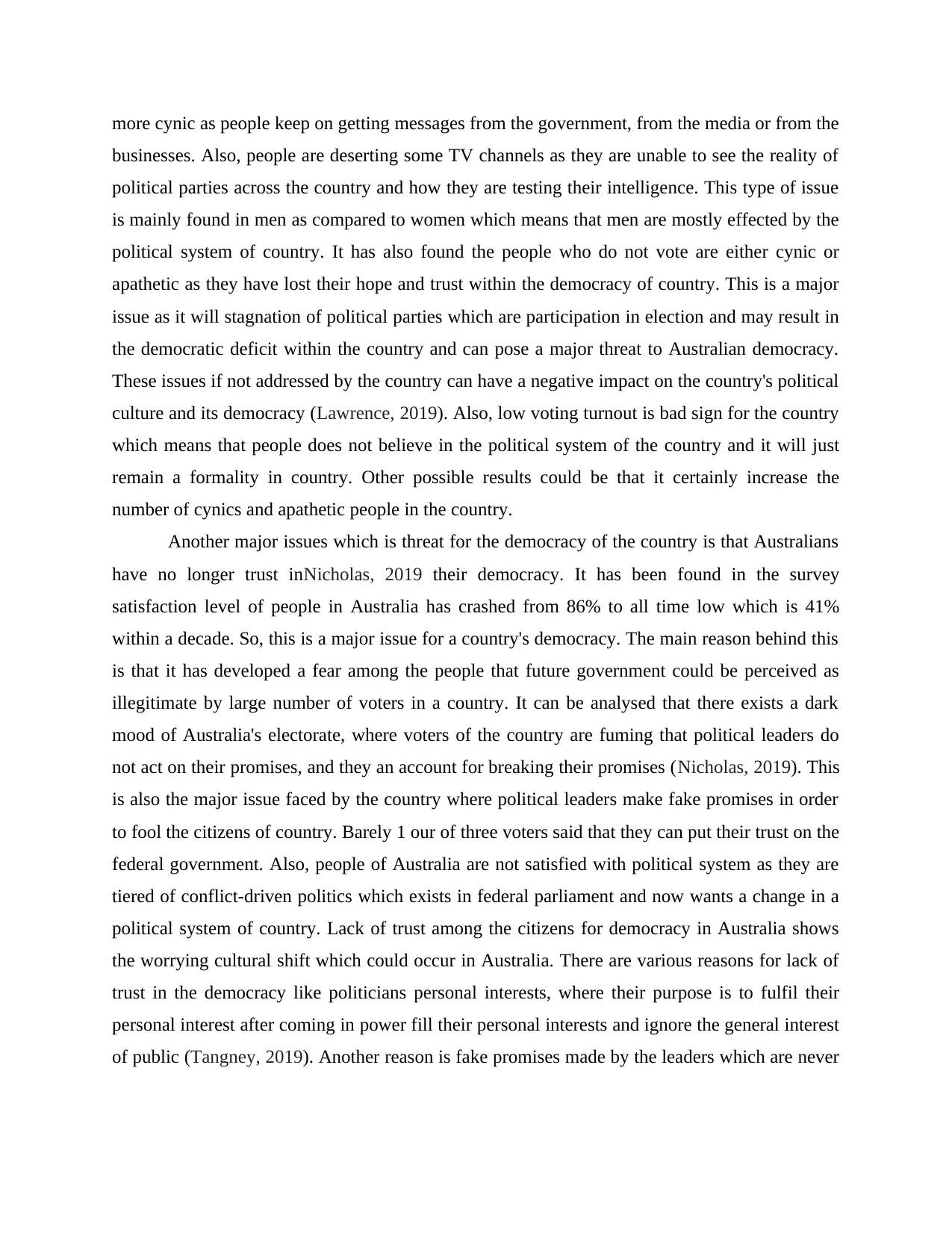
more cynic as people keep on getting messages from the government, from the media or from the
businesses. Also, people are deserting some TV channels as they are unable to see the reality of
political parties across the country and how they are testing their intelligence. This type of issue
is mainly found in men as compared to women which means that men are mostly effected by the
political system of country. It has also found the people who do not vote are either cynic or
apathetic as they have lost their hope and trust within the democracy of country. This is a major
issue as it will stagnation of political parties which are participation in election and may result in
the democratic deficit within the country and can pose a major threat to Australian democracy.
These issues if not addressed by the country can have a negative impact on the country's political
culture and its democracy (Lawrence, 2019). Also, low voting turnout is bad sign for the country
which means that people does not believe in the political system of the country and it will just
remain a formality in country. Other possible results could be that it certainly increase the
number of cynics and apathetic people in the country.
Another major issues which is threat for the democracy of the country is that Australians
have no longer trust inNicholas, 2019 their democracy. It has been found in the survey
satisfaction level of people in Australia has crashed from 86% to all time low which is 41%
within a decade. So, this is a major issue for a country's democracy. The main reason behind this
is that it has developed a fear among the people that future government could be perceived as
illegitimate by large number of voters in a country. It can be analysed that there exists a dark
mood of Australia's electorate, where voters of the country are fuming that political leaders do
not act on their promises, and they an account for breaking their promises (Nicholas, 2019). This
is also the major issue faced by the country where political leaders make fake promises in order
to fool the citizens of country. Barely 1 our of three voters said that they can put their trust on the
federal government. Also, people of Australia are not satisfied with political system as they are
tiered of conflict-driven politics which exists in federal parliament and now wants a change in a
political system of country. Lack of trust among the citizens for democracy in Australia shows
the worrying cultural shift which could occur in Australia. There are various reasons for lack of
trust in the democracy like politicians personal interests, where their purpose is to fulfil their
personal interest after coming in power fill their personal interests and ignore the general interest
of public (Tangney, 2019). Another reason is fake promises made by the leaders which are never
businesses. Also, people are deserting some TV channels as they are unable to see the reality of
political parties across the country and how they are testing their intelligence. This type of issue
is mainly found in men as compared to women which means that men are mostly effected by the
political system of country. It has also found the people who do not vote are either cynic or
apathetic as they have lost their hope and trust within the democracy of country. This is a major
issue as it will stagnation of political parties which are participation in election and may result in
the democratic deficit within the country and can pose a major threat to Australian democracy.
These issues if not addressed by the country can have a negative impact on the country's political
culture and its democracy (Lawrence, 2019). Also, low voting turnout is bad sign for the country
which means that people does not believe in the political system of the country and it will just
remain a formality in country. Other possible results could be that it certainly increase the
number of cynics and apathetic people in the country.
Another major issues which is threat for the democracy of the country is that Australians
have no longer trust inNicholas, 2019 their democracy. It has been found in the survey
satisfaction level of people in Australia has crashed from 86% to all time low which is 41%
within a decade. So, this is a major issue for a country's democracy. The main reason behind this
is that it has developed a fear among the people that future government could be perceived as
illegitimate by large number of voters in a country. It can be analysed that there exists a dark
mood of Australia's electorate, where voters of the country are fuming that political leaders do
not act on their promises, and they an account for breaking their promises (Nicholas, 2019). This
is also the major issue faced by the country where political leaders make fake promises in order
to fool the citizens of country. Barely 1 our of three voters said that they can put their trust on the
federal government. Also, people of Australia are not satisfied with political system as they are
tiered of conflict-driven politics which exists in federal parliament and now wants a change in a
political system of country. Lack of trust among the citizens for democracy in Australia shows
the worrying cultural shift which could occur in Australia. There are various reasons for lack of
trust in the democracy like politicians personal interests, where their purpose is to fulfil their
personal interest after coming in power fill their personal interests and ignore the general interest
of public (Tangney, 2019). Another reason is fake promises made by the leaders which are never
⊘ This is a preview!⊘
Do you want full access?
Subscribe today to unlock all pages.

Trusted by 1+ million students worldwide
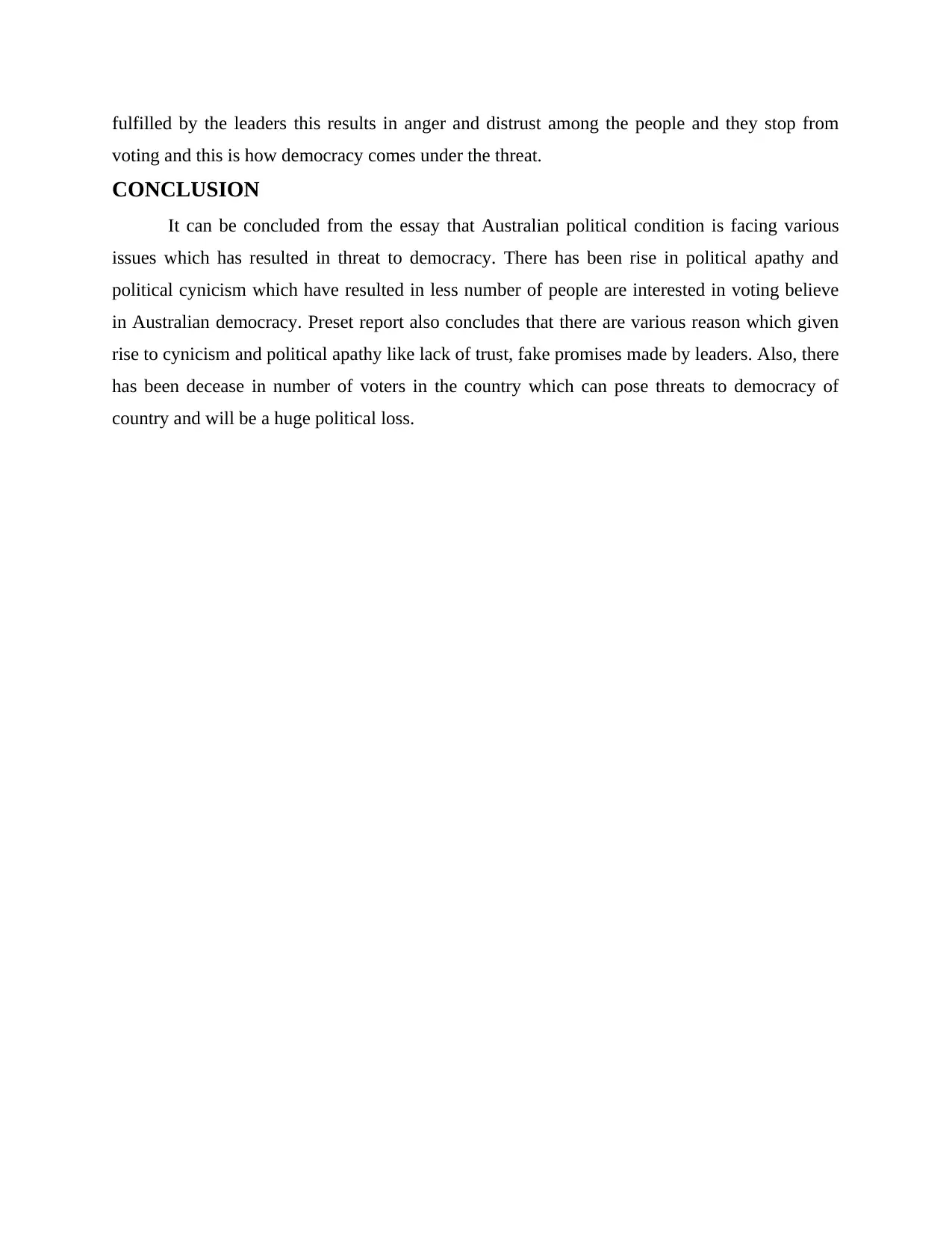
fulfilled by the leaders this results in anger and distrust among the people and they stop from
voting and this is how democracy comes under the threat.
CONCLUSION
It can be concluded from the essay that Australian political condition is facing various
issues which has resulted in threat to democracy. There has been rise in political apathy and
political cynicism which have resulted in less number of people are interested in voting believe
in Australian democracy. Preset report also concludes that there are various reason which given
rise to cynicism and political apathy like lack of trust, fake promises made by leaders. Also, there
has been decease in number of voters in the country which can pose threats to democracy of
country and will be a huge political loss.
voting and this is how democracy comes under the threat.
CONCLUSION
It can be concluded from the essay that Australian political condition is facing various
issues which has resulted in threat to democracy. There has been rise in political apathy and
political cynicism which have resulted in less number of people are interested in voting believe
in Australian democracy. Preset report also concludes that there are various reason which given
rise to cynicism and political apathy like lack of trust, fake promises made by leaders. Also, there
has been decease in number of voters in the country which can pose threats to democracy of
country and will be a huge political loss.
Paraphrase This Document
Need a fresh take? Get an instant paraphrase of this document with our AI Paraphraser
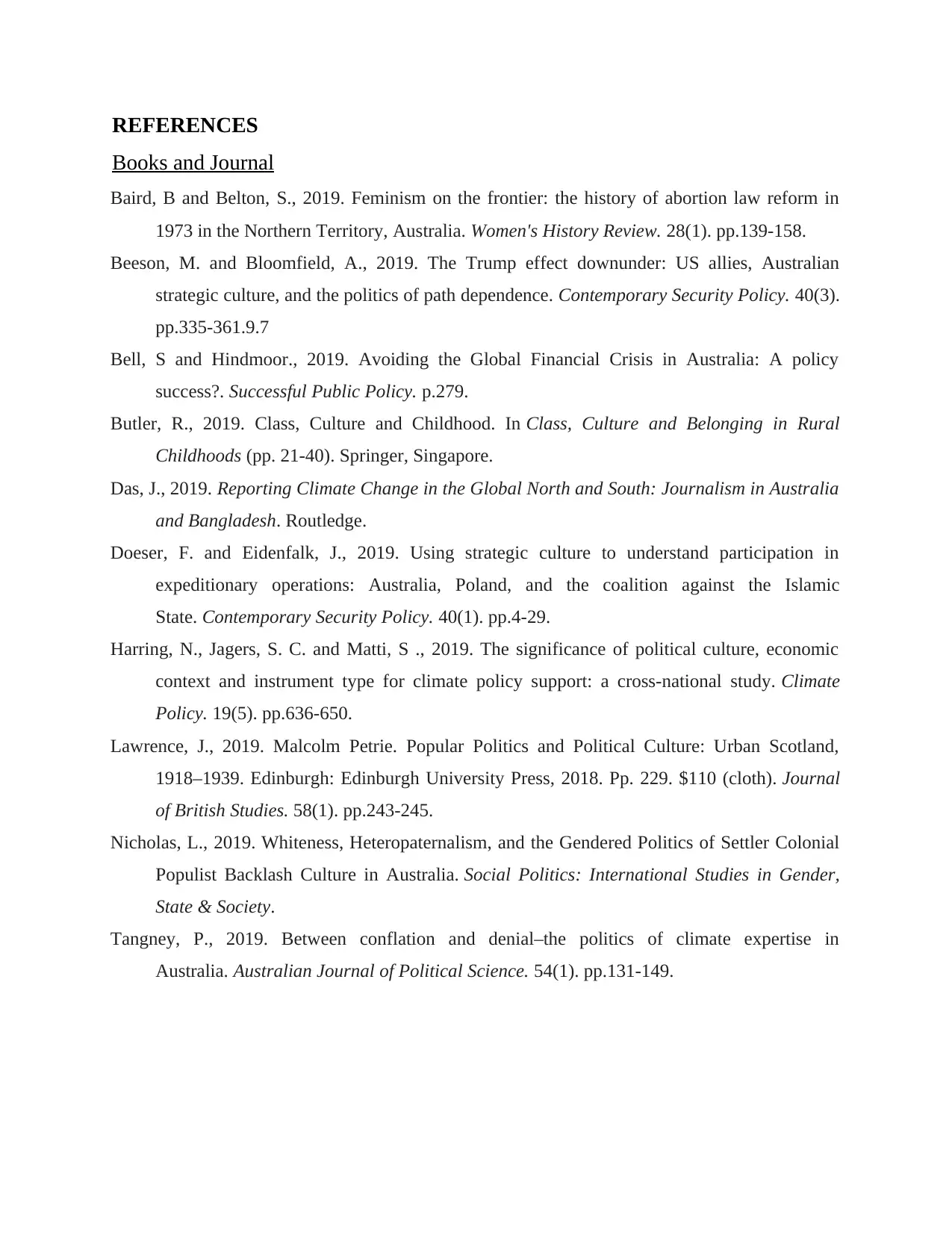
REFERENCES
Books and Journal
Baird, B and Belton, S., 2019. Feminism on the frontier: the history of abortion law reform in
1973 in the Northern Territory, Australia. Women's History Review. 28(1). pp.139-158.
Beeson, M. and Bloomfield, A., 2019. The Trump effect downunder: US allies, Australian
strategic culture, and the politics of path dependence. Contemporary Security Policy. 40(3).
pp.335-361.9.7
Bell, S and Hindmoor., 2019. Avoiding the Global Financial Crisis in Australia: A policy
success?. Successful Public Policy. p.279.
Butler, R., 2019. Class, Culture and Childhood. In Class, Culture and Belonging in Rural
Childhoods (pp. 21-40). Springer, Singapore.
Das, J., 2019. Reporting Climate Change in the Global North and South: Journalism in Australia
and Bangladesh. Routledge.
Doeser, F. and Eidenfalk, J., 2019. Using strategic culture to understand participation in
expeditionary operations: Australia, Poland, and the coalition against the Islamic
State. Contemporary Security Policy. 40(1). pp.4-29.
Harring, N., Jagers, S. C. and Matti, S ., 2019. The significance of political culture, economic
context and instrument type for climate policy support: a cross-national study. Climate
Policy. 19(5). pp.636-650.
Lawrence, J., 2019. Malcolm Petrie. Popular Politics and Political Culture: Urban Scotland,
1918–1939. Edinburgh: Edinburgh University Press, 2018. Pp. 229. $110 (cloth). Journal
of British Studies. 58(1). pp.243-245.
Nicholas, L., 2019. Whiteness, Heteropaternalism, and the Gendered Politics of Settler Colonial
Populist Backlash Culture in Australia. Social Politics: International Studies in Gender,
State & Society.
Tangney, P., 2019. Between conflation and denial–the politics of climate expertise in
Australia. Australian Journal of Political Science. 54(1). pp.131-149.
Books and Journal
Baird, B and Belton, S., 2019. Feminism on the frontier: the history of abortion law reform in
1973 in the Northern Territory, Australia. Women's History Review. 28(1). pp.139-158.
Beeson, M. and Bloomfield, A., 2019. The Trump effect downunder: US allies, Australian
strategic culture, and the politics of path dependence. Contemporary Security Policy. 40(3).
pp.335-361.9.7
Bell, S and Hindmoor., 2019. Avoiding the Global Financial Crisis in Australia: A policy
success?. Successful Public Policy. p.279.
Butler, R., 2019. Class, Culture and Childhood. In Class, Culture and Belonging in Rural
Childhoods (pp. 21-40). Springer, Singapore.
Das, J., 2019. Reporting Climate Change in the Global North and South: Journalism in Australia
and Bangladesh. Routledge.
Doeser, F. and Eidenfalk, J., 2019. Using strategic culture to understand participation in
expeditionary operations: Australia, Poland, and the coalition against the Islamic
State. Contemporary Security Policy. 40(1). pp.4-29.
Harring, N., Jagers, S. C. and Matti, S ., 2019. The significance of political culture, economic
context and instrument type for climate policy support: a cross-national study. Climate
Policy. 19(5). pp.636-650.
Lawrence, J., 2019. Malcolm Petrie. Popular Politics and Political Culture: Urban Scotland,
1918–1939. Edinburgh: Edinburgh University Press, 2018. Pp. 229. $110 (cloth). Journal
of British Studies. 58(1). pp.243-245.
Nicholas, L., 2019. Whiteness, Heteropaternalism, and the Gendered Politics of Settler Colonial
Populist Backlash Culture in Australia. Social Politics: International Studies in Gender,
State & Society.
Tangney, P., 2019. Between conflation and denial–the politics of climate expertise in
Australia. Australian Journal of Political Science. 54(1). pp.131-149.
1 out of 8
Related Documents
Your All-in-One AI-Powered Toolkit for Academic Success.
+13062052269
info@desklib.com
Available 24*7 on WhatsApp / Email
![[object Object]](/_next/static/media/star-bottom.7253800d.svg)
Unlock your academic potential
Copyright © 2020–2026 A2Z Services. All Rights Reserved. Developed and managed by ZUCOL.





